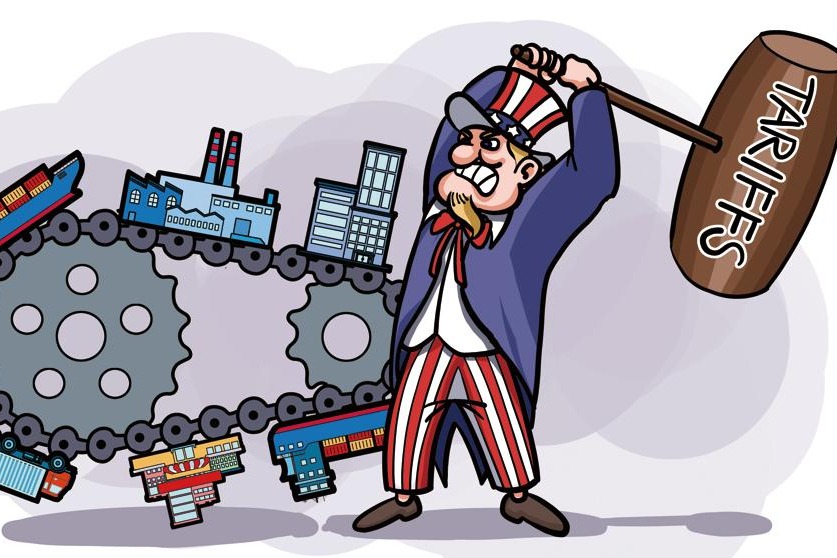New quality productive forces energize emerging sectors


With the world experiencing a new technological revolution and undergoing an industrial transformation, China's industries face new challenges. The policy adjustments in developed countries and shifting of industries to and improvement of the development environment in some emerging economies pose serious challenges to China's industrial development. To make matters worse, the traditional development space is narrowing, and old development models are becoming unsustainable.
Therefore, it is imperative that China cultivate and develop new quality productive forces to seize the development opportunities and overcome the constraints in order to boost economic recovery and promote high-quality industrial development.
To foster new quality productive forces, China must leverage its industrial and market advantages to develop frontier and original technologies, and make revolutionary breakthroughs in the field of science and technology. Already a major global player in technology R&D, China was ranked 12th in the World Intellectual Property Organization's Global Innovation Index 2023 and has the largest number of top 100 science and technology clusters in the world.
After missing several occasions to seize the opportunities of technology revolutions in the past, China seems set to become a significant player in the new wave of technological and industrial changes. Self-reliance in science and technology is crucial for China to become a more important player in global technology development and establish itself as a key participant in new technology revolution and industrial transformation.
China has made remarkable strides in mobile communications, electric vehicles (EVs), renewable energy and high-speed railways, and is a leading player in AI, quantum communications, new materials and life sciences. However, it still lags behind the developed world in the fields of integrated circuits, industrial software and key machinery. Facing fierce competition in high-tech, China should harness the synergy of technology R&D and industrialization to achieve breakthroughs in disruptive technologies in a bid to develop new quality productive forces.
Developing new quality productive forces involves expanding strategic emerging industries, nurturing future industries and upgrading traditional ones. China's extensive and resilient industrial system has been resilient to economic upheavals. But its weaknesses in high-end segments and key core areas persist, increasing the possibility of encountering technological bottlenecks in the future.
So it should take measures to ensure its strategic emerging industries consolidate the existing advantages by turning its high-quality product into systemic advantages. For instance, China's EV industry, which accounts for 60 percent of the total global production, has built a comprehensive ecosystem, ranging from producing core components to providing after-sales services. Also, emerging industries in China must leverage their advantages to bridge the gap with that of the advanced economies, and collaborate with global partners to create a fairer global environment so they can supply their products to more markets.
For future industries with high risks and uncertainties, China needs to adopt a forward-looking approach, using its comprehensive industry chain and institutional advantages to pilot cutting-edge technologies and identify viable development models for industrialization and commercialization.
As for traditional industries, they need to transform themselves, and incorporate new technologies and business models to take advantage of the technology revolution and industrial changes. For that, the authorities have to improve market regulations to mitigate overcapacity, phase out outdated production models and optimize product structures. And energy-intensive industries must adopt green, low-carbon policies, reduce their carbon emissions and decrease their reliance on fossil fuels.
Developing new quality productive forces requires efficient use of resources and harnessing of the power of data. In this age of the internet, technology and talent are the most critical resources. Yet China's education, research and talent cultivation systems face various challenges, with imbalances in the supply and demand of talent across regions, industries and enterprises. Especially scarce are scientists, innovative entrepreneurs and multi-skilled technical personnel in strategic fields.
Besides, the reforms being carried out should be in line with the requirement for new skilled personnel and R&D must align with the current high-tech trends, so as to incentivize talent and create wealth.
Additionally, data are becoming the most dynamic production factor. In digital products and services, data are directly consumed as a value carrier. More important, data empowerment in various industries generates substantial multiplier effects.
As a populous and industrially diverse country, China's data resource potential is unparalleled. To cash in on this advantage, China needs to build robust data transmission and application infrastructure, and promote data trading, and establish data-protection frameworks to set global data usage standards and rules.
By fostering strategic emerging industries, laying the groundwork for future industries and upgrading traditional ones, China can build an advanced industrial system, thus consolidating the foundation for the development of new quality productive forces. This strategic push will not only enhance China's industrial capacity but also position it as a crucial player in the global economic landscape, contributing to the development of a more balanced and inclusive world economy.
The author is an associate research fellow at the Institute of Industrial Economics of the Chinese Academy of Social Sciences. The views don't necessarily reflect those of China Daily.
If you have a specific expertise, or would like to share your thought about our stories, then send us your writings at opinion@chinadaily.com.cn, and comment@chinadaily.com.cn.


































